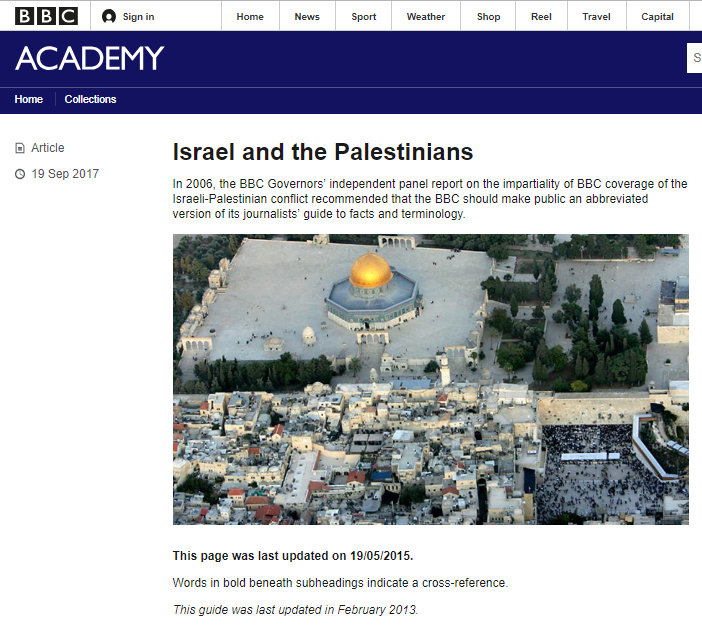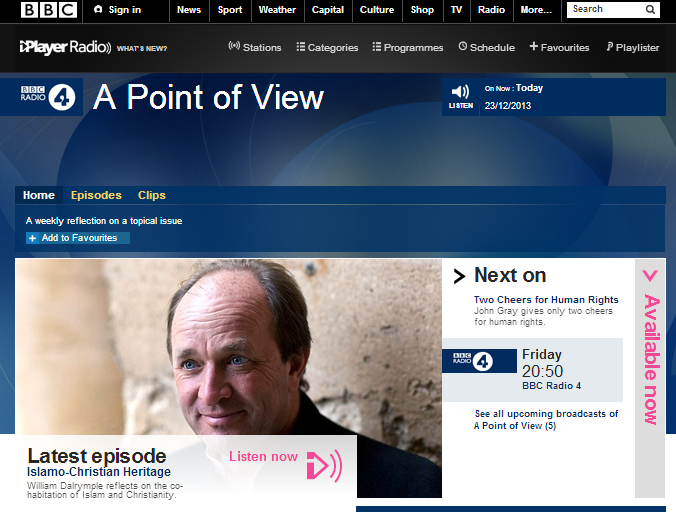Back in January 2018 BBC Watch prompted an amendment to the synopsis of a Radio 4 programme which breached the corporation’s own style guide.
The BBC Academy’s “journalists’ guide to facts and terminology” – published on the recommendation of the BBC Governors’ independent panel report on the impartiality of BBC coverage of the Israeli-Palestinian conflict in 2006 – instructs the corporation’s staff not to use the term Palestine (as was originally the case in that synopsis) except in very specific circumstances.
“There is no independent state of Palestine today, although the stated goal of the peace process is to establish a state of Palestine alongside a state of Israel.
In November 2012 the PLO secured a vote at the UN General Assembly, upgrading its previous status as an “entity” so that the UN now recognises the territories as “non-member observer state”. […]
But the UN vote has not created a state of Palestine (rather, it failed in its bid to join the UN as a full member state in 2011 because of a lack of support in the Security Council).
So, in day-to-day coverage of the Middle East you should not affix the name ‘Palestine’ to Gaza or the West Bank – rather, it is still an aspiration or an historical entity.” [emphasis added]
Nevertheless, throughout 2018 we saw increased cross-platform employment of the term ‘Palestine’ by BBC journalists and presenters as well as by contributors. Some of the examples we documented appear below. [emphasis in bold added]
January 2018:
Radio 5 live item promotes apartheid analogy, breaches style guide
Adrian Goldberg: “Whether or not people agree with it will be down to their personal view of the State of Israel and its occupation of Palestine.”
Hamas ‘Hardtalk’ interview rebuts BBC messaging, perpetuates inaccuracies – part one
Stephen Sackur: “Is the resistance in Palestine now in the hands of ordinary people – young people particularly – not with veteran leaders like you?”
February 2018:
BBC R4 airs partisan portrayal of Jenin masked as ‘entertainment’
Mark Thomas (contributor): “Well what happened was I went to Palestine in 2009 and I walked the length of the Israeli wall in the West Bank.”
Thomas: “I look at it very, very simply that people confuse Israel and Palestine as a conflict and it’s not a conflict. It’s a military occupation.
Thomas: “What I want to do is confound people’s ideas of what refugees are and to make people challenge their own ideas about how their relationship is with places like Palestine, with people who are refugees…”
May 2018:
BBC R4 FOOC report on Palestinian music promotes one-sided politics
Robin Denselow: “Promoting culture in Palestine is absolutely crucial, he told me. It’s a form of resistance, protecting the national heritage. The minister, who enthused about the years he spent studying at Cardiff University, gave us a personal tour of an uncompleted but palatial new building on a Ramallah hilltop. Originally intended as a grand guest-house for visiting dignitaries, it’s to be Palestine’s new national library and cultural hub. […] He claimed that what is happening on the cultural front in Palestine is a miracle it’s exceptionally hard to achieve under occupation.”
Inaccuracy, omission and oddity in a BBC Radio Ulster item on Israel – part one
Roisin McAuley: “International attention is once again focused on the Israel-Palestine conflict.”
Inaccuracy, omission and oddity in a BBC Radio Ulster item on Israel – part two
Roisin McAuley: “You mentioned a youth bulge. There is a youth bulge in Palestine as well.”
August 2018:
Breaches of the BBC Academy ‘style guide’ continue
Paul Henley: “Do you think he was disappointed that his vision for peace between Israel and Palestine was not achieved in his lifetime?”
November 2018:
BBC R4’s ‘Today’ highlights Quaker hypocrisy but still fails listeners
Justin Webb: “Are you saying that you would not invest in other places where governments are, in your view, oppressing people or is it just in Palestine?”
That trend appears to be continuing:
January 2019:
One to watch out for on BBC Two
“…will international signing be a bridge for them to meet in the middle and discuss the issue of Israel and Palestine?”
There is of course little point in having a style guide if journalists, presenters and producers – particularly it would seem at BBC Radio 4 – ignore its guidance. Obviously given that the style guide correctly states “there is no independent state of Palestine today”, there is no reason whatsoever for BBC journalists to be promoting the inaccurate impression that such a state exists.
Related Articles:
Accuracy and impartiality fails in Welsh language show on BBC iPlayer – part one




